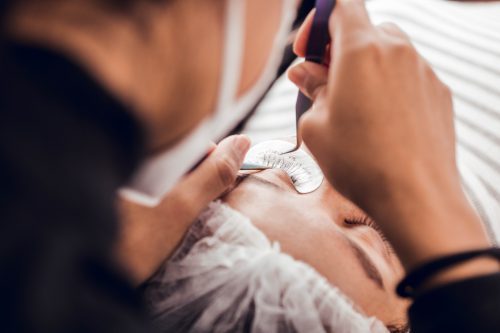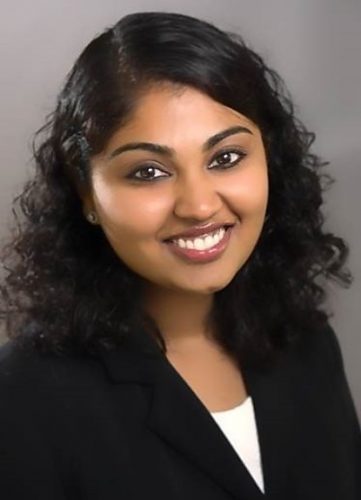If you’ve ever wished your eyelashes were longer, fuller or darker, you’re not alone. Eyelash enhancements continue to grow in popularity—particularly in the last couple of years when the need for face masks has put an increased focus on the eyes. Focus spoke with Nandini Venkateswaran, MD, a cornea specialist, to learn about the safety of eyelash enhancement options.
How eyelashes protect your eyes
The eyelashes and the edge of the eyelid—called the eyelid margin—are very important for our overall eye health. Each time you blink, your eyelashes are removing and shifting debris particles away from your eye. “Taking proper care of your eyelashes ultimately protects the surface of your eyes,” said Nandini Venkateswaran, MD, a member of the Cornea and Refractive Surgery Service at Mass Eye and Ear
The meibomian glands—which secrete oils that help keep our eyes hydrated and protect against dry eye—are also found on the eyelid margin. Any debris or loss of lashes can impair the function of the meibomian glands and directly affect the surface of the eyes.
Although popular eyelash enhancements like false lashes and lash extensions may look pretty, Dr. Venkateswaran cautioned that they could cause allergic or inflammatory reactions, as well as physical damage to the real lashes caused by the extra weight from the extensions.
Applying false eyelashes at home
False eyelashes that stick to the eye with a special glue have been around for over 100 years. Part of their continued popularity is that overall, they’re quite safe to use. Still, Dr. Venkateswaran emphasizes a few points for ensuring safety when using these products.
First, it’s important to avoid handling the product too much once it’s placed near your eyes. Dr. Venkateswaran recommends using them as instructed, and once applied, to not leave them on for longer than recommended (usually not more than 12 hours) or sleep with them. Remove the eyelashes carefully and care for them as instructed.
“Don’t try to cut corners,” said Dr. Venkateswaran. “The products can have a buildup of debris or cause inflammation if not cleaned and stored properly. If the directions say they can be reused for a certain number of times, be sure to buy a new set when needed,” she said.
Professional eyelash extensions at the salon
 Eyelash extensions are false lashes that are glued individually along the lash line, so that they blend in with the natural lashes. They also last much longer—up to a couple of months – if you care for them properly.
Eyelash extensions are false lashes that are glued individually along the lash line, so that they blend in with the natural lashes. They also last much longer—up to a couple of months – if you care for them properly.
For these, Dr. Venkateswaran recommends finding a licensed esthetician or cosmetologist to apply the lashes. Make sure they use appropriate products, can answer your questions about how to care for the eyelashes and take precautions to protect the actual surface of the eye.
Are magnetic lashes safe?
The combination of magnetic eyeliner and eyelashes is relatively new, but it’s quickly gaining popularity. The product is twofold: liquid eyeliner containing magnetic iron oxides and false lashes with a magnetic base. You apply the eyeliner the way you would any other eyeliner, and the false lashes stick to it without the need for extra adhesive.
But is having magnetic particles near your eye safe? In this case, yes! The iron oxides are regulated by the U.S. Food and Drug Administration (FDA), and other additives are known to be safe for skincare and cosmetics, so it is a safe product to use on the eyelid margin, according to Dr. Venkateswaran. “And there’s really no problem with the magnets adhering to the skin, so as long as they aren’t going into the eye, they’re safe to be on the eyelid skin,” she said.
Dr. Venkateswaran also pointed out that in some cases, magnetic lashes might actually be safer than other alternatives: “They could potentially help avoid allergic reactions or complications of glue or traditional eyelash extensions,” she said. “It’s important to be safe with them, because if you place the eyelashes incorrectly, they are heavy and might tear your real lashes or slide off and hit the cornea. Always make sure you’re following directions.”
Applying eyelash serums
If you don’t want to use extensions but still wish you had longer or fuller lashes, you may be interested in eyelash serums. Dr. Venkateswaran recommends choosing the FDA-approved Latisse, a prescription-only serum that contains prostaglandin analogues, which have been studied and approved for eyelash growth.
“I do caution patients about using generic over-the-counter lash serums,” said Dr. Venkateswaran. If a product isn’t FDA-approved, the safety and effectiveness may not be entirely known because they haven’t been formally studied. In fact, many products marketed for lash growth don’t actually lengthen or increase the thickness of the lashes.
“These products use terminology like ‘lash enhancement’ or ‘lash conditioning,’ so it’s more of a cosmetic effect,” she said. “I recommend patients stick with what’s been tested and true, especially if they find it challenging to put on extensions or follow through on upkeep.”
Be cautious of new trends
Dr. Venkateswaran encourages patients to be wary of trends they may see online and instead opt for products that are designed to be used on the eye.
“I’ve seen a new trend on social media, where people are using hair dryers to curl their lashes,” Dr. Venkateswaran said. “That really concerns me because the heat from a hair dryer isn’t meant to be put on the face, especially near the eye area. That kind of heat can cause significant eye dryness, which can lead to corneal abrasions or infections,” she cautioned.
Choosing the best lash enhancement option
According to Dr. Venkateswaran, there isn’t one option that’s the best or the safest. “There are good options for different people, depending on your level of comfort applying different products, the look you want to achieve and your budget,” she said.
“It’s important to know the product, know the ingredients, and know how to take care of them,” Dr. Venkateswaran added. “And if you develop eyelid swelling, dry eyes, or changes to your vision when using a product, discontinue use and see an eyecare professional. In general, these are all great options with proven track records for safe eyelash enhancement.”
About our expert
Nandini Venkateswaran, MD, is a cornea specialist who specializes in cataracts, cornea, and refractive surgery. She sees patients at Mass Eye and Ear, Waltham, as well as the Main Campus in Boston.
is a cornea specialist who specializes in cataracts, cornea, and refractive surgery. She sees patients at Mass Eye and Ear, Waltham, as well as the Main Campus in Boston.